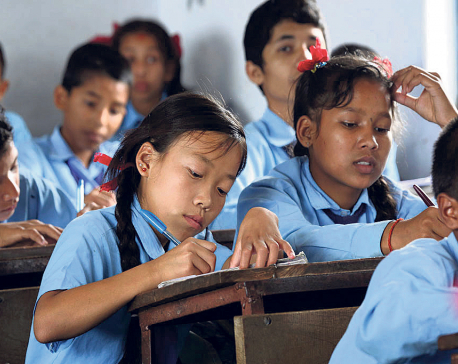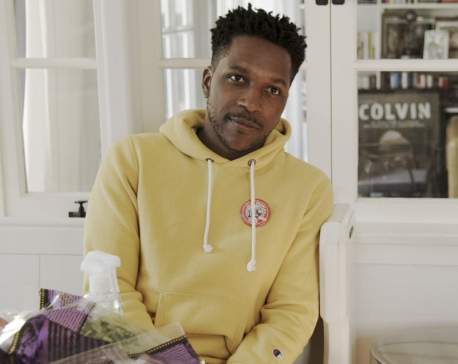
OR


Simone Galimberti
Simone Galimberti is the Co-Founder of ENGAGE, an NGO partnering with youths to promote social inclusion in Nepal.simone_engage@yahoo.com
Local citizens helping out in this lockdown are an example of what the future might hold
Over the last month we are seeing how a crisis like the ongoing lockdown to prevent the spread of Covid-19 is bringing again the best out of the people. I am saying again because it has been the same during the emergency following the earthquakes that hit the country.
Back then, masses of responsible citizens went all the ways to support those communities that were shocked the most. When something big happens, communities are stepping up, pledging their time, money and energies to support those most in need.
Over the last weeks we saw citizens, many of them single individuals and members of local, grassroots level community groups, offering emergency assistance to their peers, citizens like them, who are suffering the most from this lockdown. We are witnessing here two global phenomena that although different, opposite in their nature and yet markedly interlinked and interplay with each other: one a plague, an warning notice on how worse things could turn out in the near future, the other, instead, a hope, a promise that future could be better.
On one hand, we have the already well known, already studied and talked about phenomenon of raising levels of inequality, the increasing disparities between those who have and those who have not.
No matter how much strong the economic growth in Nepal has been, whose more visible outcome has been an emerging middle class with the wants and desires of the capitalistic life, there are still too many citizens lagging behind, forgotten and unseen.
These are those peers of us who have been living on a meager daily wages, who have been scrapping a life day by day with no security and often with little safety. Most of them are youth whose only dream might be migrating as laborers, a hope probably dashed by the devastating effects of this pandemic over the global economy.
Many of them are instead family breadwinners, courageous women and men whose children are unfortunately destined to struggle in the years to come, being deprived of many essential supporting elements that should be instead their inalienable rights since birth.
This is a global phenomenon, a dark stain on the conscience of many of us, gaining from an economic system that is still too unjust and unfair for too many. While it is hard to predict how a post pandemic scenario will play out, one thing is sure, millions and millions of people who were already conducting precarious lives, will again face a more daunting and scary poverty.
From the World Bank to the International Monetary Fund to the Asia Development Bank, there is one thing in which there is unanimity it is that there will be a massive raise in global poverty. I was watching a video of thousands of people queuing for hours and hours in order to get some relief in a township in the outskirts of Pretoria, the capital of South Africa. In countries like Italy and Spain, the heart of the European Union, some persons have been pushed to the extremes, some even selling their gold and depending for their meals on local food banks.
Of course many citizens there can count on more effective governance systems that are trying to deploy their power to offset the consequences of the lockdown but it is not enough. We see the same in the United States of America where the virus and the lockdown have been hitting mostly Afro-American citizens who have, in general, fewer protections and more precarious lives.
On the other hand, here in Nepal we are witnessing here, with great admiration, how citizens can come together amid this gloomy scenario. Preparing meals twice daily, handing out essential food, providing waters to those citizens forced to walk for days in order to reach their homes because they could not survive anymore in the big cities, we saw how the spirit of altruism, empathy and solidarity remain effective and powerful to offset the sufferance of many.
Fortunately local governments, especially those at closest contact with the population, like the wards, have also been playing a very important role and often they have been collaborating and supporting these community organizing endeavors. While no one has a crystal ball to predict how the future will pan out, many are hoping for a global “reset” through which a more just, fairer economic system can be shaped out.
My optimism drives my imagination where a new economic order will be founded on three pillars: first sustainability and climate resilience with radical changes in the way energy is produced and consumed, with massive investments in green transports; second a rethinking of what profit maximization means, focused on social economy and massive investments in public interest, social purpose organizations, either social business or not for profit; third, a new global consciousness that emphasizes more generosity and altruistic behaviors.
Such transformation should be empowered by decentralized forms of governments who must be more effective and efficient in building robust safety nets, starting from revamped health cares and national education system. The governments in partnership with non-state actors should play a key role in promoting behavior changes, helping in regenerating and rekindling people’s spirits, motivating and rewarding more solidarity driven behaviors.
It is also up to the people not to withdraw in their “shells” once the emergency will be over and keep playing a role not only at demanding better forms of capitalism and governance but also play a part in shaping the new rules on the grounds. For a country like Nepal I hope that, while the political leaders will ultimately realize and make sense of their responsibilities and step up their game, the citizenry will show the way, working in partnership as much as possible with the local governments, kicking off a bottom up reformation.
Galimberti is the Co-Founder of ENGAGE, an NGO partnering with youths to promote social inclusion in Nepal
You May Like This

How the government is failing education
The students who have been deprived of learning will look back to this time to recall how the government failed... Read More...

‘Love in the Time of Corona’ is ‘time capsule’ of the times
From grappling with big life decisions to a marriage on the brink, a new four-part miniseries tackles relationship struggles during... Read More...

The COVID shock to the dollar
NEW HAVEN – Pandemic time runs at warp speed. That’s true of the COVID-19 infection rate, as well as the... Read More...




Just In
- MoHP cautions docs working in govt hospitals not to work in private ones
- Over 400,000 tourists visited Mustang by road last year
- 19 hydropower projects to be showcased at investment summit
- Global oil and gold prices surge as Israel retaliates against Iran
- Sajha Yatayat cancels CEO appointment process for lack of candidates
- Govt padlocks Nepal Scouts’ property illegally occupied by NC lawmaker Deepak Khadka
- FWEAN meets with President Paudel to solicit support for women entrepreneurship
- Koshi provincial assembly passes resolution motion calling for special session by majority votes







_20220508065243.jpg)






Leave A Comment